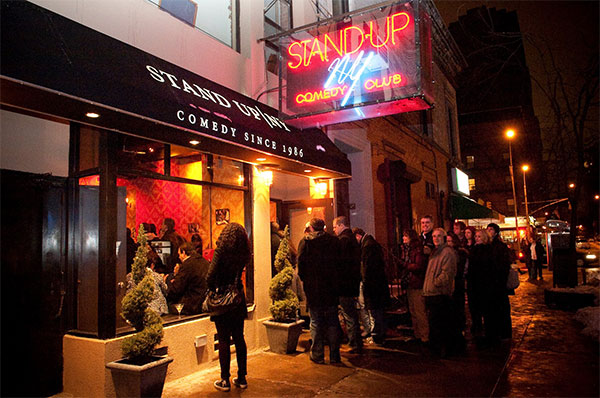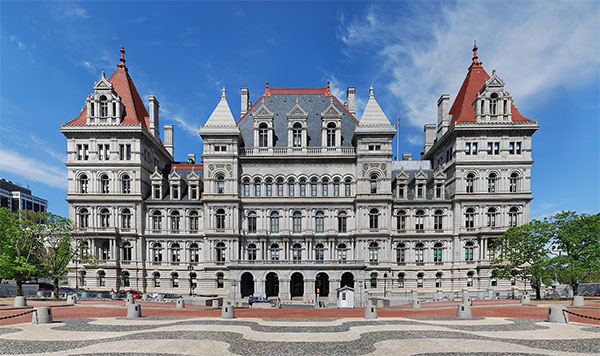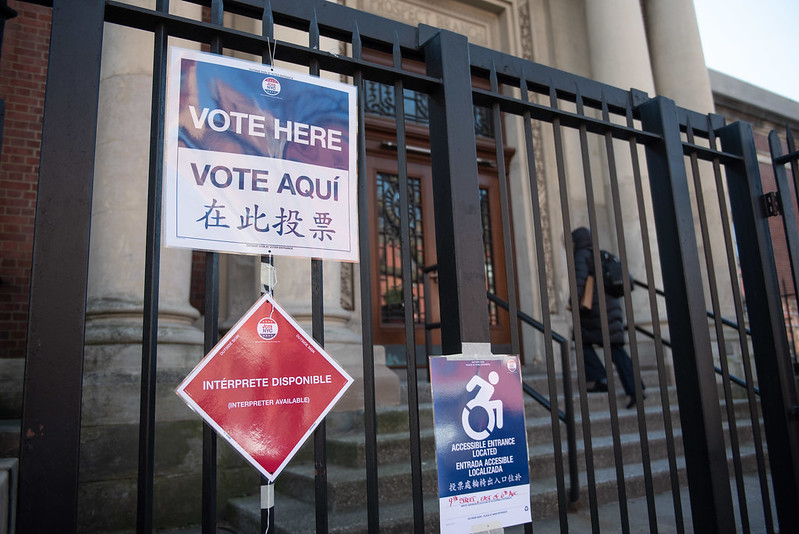It’s Time to Bring Joy Back to New York

Stand Up NY
Laughter brings people joy, something that we’ve been missing for so long in New York thanks to the shutdowns by Governor Andrew Cuomo. We need New York to heal. That’s why I convinced my friend Dani Zoldan, the owner of Stand Up NY, to sue the governor.
Prior to this lawsuit, Dani was putting on shows in parks and subway cars. He was working around the mandates imposed on small businesses by the governor and other elected representatives. Dani skirted the law and put on comedy shows without a license, because the law was unjust. It was this injustice that left no choice but to take legal action. Dani said, “The comedy scene in New York City is the best in the world. The overall consensus is that comics want to perform again, New Yorkers want to laugh and venues want to receive guidelines so they can safely reopen.”
He’s right.
Getting this right required conversations with numerous lawyers, including Democrats, Republicans, and Libertarians, among others, and they had different approaches to this case. Some were too expensive. Others didn’t have the right experience. Some had positive results in bringing suit, but didn’t come across as compelling litigators. After numerous consultations, we felt good about hiring James Mermigis, the “Anti-Shutdown Lawyer.” But, there was a problem.
Imagine being a comedy club owner on the Upper West Side like Dani—who considers himself an independent with progressive values, teaming up with Mermigis, who voted for Trump. Dani depends on the local community to put food on the table, and this might feel like doom for a small business. But that’s not the case.
Part of the healing process is bringing people together. After four years of heated debates and a year of social isolation forced upon us by the governor, it’s time to bridge the divide. Dani and James were a great match because they think differently, yet want the same outcomes.
Dani and James may not agree on everything, but they agree on enough. This team championed the arts, culture, and small businesses that are dear to our hearts. We announced the lawsuit on The Sharpe Way, and raised awareness with LegalizeComedy.NYC. The lawsuit was filed on March 1, and Dani went on a media blitz the next day. By March 3, Governor Cuomo announced that he would permit entertainment venues to open on April 2. Pushing him into a corner to make the right decision was a huge win for our wonderful city. With comedy and other entertainment come laughter and joy.
Dani was not just representing his club. He was representing the community of local comics and other artists in New York who could not work, because of these suffocating mandates. We went to battle with the governor, head on. We won. We’re bringing back comedy clubs, laughter, and joy. We have a chance to heal.
***
Larry Sharpe is host of The Sharpe Way and was the Libertarian Party nominee for governor of New York in 2018. On Twitter @LarrySharpe.
***
Have an op-ed idea or submission for Gotham Gazette? Email This email address is being protected from spambots. You need JavaScript enabled to view it.
Missing Pieces of the Pot Discourse

The State Capitol in Albany (photo: CC-BY-SA-3.0/Matt H. Wade at Wikimedia Commons)
In a recent column published by Gotham Gazette, Manhattan District Attorney candidate Diana Florence extolled the push to commercialize marijuana in New York as a means to shore up our budget issues and solve social justice inequities. In short, the former Assistant District Attorney’s piece, like many other arguments about moving full-steam ahead with legalization, is quite far off the mark — here’s why:
Our state took an enormous blow from COVID-19. As a result, Governor Cuomo and others in Albany are scrambling to find ways to fix our shortfall, but we must not fall for the canard that allowing Big Pot in is the fix.
Governor Cuomo and others who are pushing for commercialization have claimed that legalizing marijuana would bring in $350 million a year in revenue. What’s missing from this is the fact that New York wouldn’t see pot revenues for quite some time. Ironically, both the main sponsor of the Senate’s legalization bill, Senator Liz Krueger, and State Budget Director Robert Mujica have been urging caution on claims that pot taxes will cure our budget woes.
As it stands, even if marijuana revenues appeared overnight, $350 million is akin to a speck of sand on the $15 billion beach that is our budget shortfall. In all, it’s just 0.2% of the overall $170 billion state budget.
And we haven’t even begun to discuss the costs associated with legalization: a study out of Colorado found that for every dollar in pot tax revenue, $4.50 must be spent to mitigate the increases in mental health and substance abuse issues, marijuana-related hospitalizations, drugged driving deaths and car crashes, and losses to workplace positivity.
Today’s marijuana is nothing like the weed of days gone by. Marijuana use has shown some significant links to serious mental health conditions — including schizophrenia, anxiety, depression, and suicide. Prolonged use has also been shown to lower IQ and motor function and can cause particular damage to the developing brains of young people. And we know this from low-potency pot; the science is still out when it comes to the super-potent marijuana readily available in “legal” states, but new evidence is beginning to paint a concerning picture.
A 2019 study found that users of higher-potency marijuana were more than five times as likely to develop a severe mental illness such as schizophrenia or psychosis. And other evidence tells us that the higher the THC potency, the higher the risk for dependence and problematic use.
Florence is right that more must be done to address racial inequities faced by communities of color, but marijuana commercialization if far from the right answer. All told, only 4% of the industry nationwide features Black ownership while pot shops are disproportionately located in communities of color, which historically lack the resources to combat predatory marketing and would be deeply harmed by increased substance abuse issues. Illinois serves as a perfect example of this.
Lawmakers there promised to “set the standard” when it came to social equity in the marijuana industry. In reality, now a year later, there is not a single minority-owned marijuana retailer in the state. Instead, licenses have gone to existing multi-state operators and connected political insiders. Social justice? Not so much.
If we truly want to help fix the damages of prohibition, we must double down on the current policy of decriminalization, expunge prior convictions, end the stigma that follows those with a drug conviction, and work to expand efforts on substance abuse prevention and treatment. Allowing a for-profit industry to come in and further harm vulnerable communities is not the answer, and it most certainly won’t fix our budget woes.
***
Dr. Kevin Sabet, PhD, is a former senior drug policy advisor to the Obama Administration. He currently serves as president of Smart Approaches to Marijuana (SAM). His new book, “Smokescreen, What The Marijuana Industry Doesn’t Want You To Know,” will be released April 20.
***
Have an op-ed idea or submission for Gotham Gazette? Email This email address is being protected from spambots. You need JavaScript enabled to view it.
Voting Rights Restoration A Good Step But New York Must End Blanket Disenfranchisement

Voting rights (photo: Michael Appleton/Mayoral Photography Office)
Voting rights and social justice advocates are counting on legislative supermajorities in Albany to begin tackling a long ignored civil rights imperative, reform of New York’s racist Civil War-era blanket voter disenfranchisement law, which strips citizens of their right to vote while in prison or on parole for a felony conviction, regardless of the nature or circumstances of the offense.
For the first time since the early 1970s, the New York State Legislature has begun to grapple with that legacy. The State Senate recently passed incremental legislation to restore voting rights to citizens on parole, and the state Assembly is poised to do the same soon.
The policy shift is a decades-long priority of voting rights groups who penned a letter to state leaders about rights restoration ahead of the 2021 legislative session. At the federal level, New York Rep. Jerry Nadler’s Democracy Restoration Act would set this standard nationally for federal elections.
Around 36,000 people are on parole in New York, nearly three-quarters of whom are non-white. A 2020 Columbia University Justice Labs Report concluded that “the impact of current parole practices in New York falls disproportionately on Black and brown communities.”
Governor Cuomo mitigated this in 2018 by signing an Executive Order, a mechanical but meandering stopgap of rolling voting-rights-only pardons. With notable exceptions, rights are restored. However, the process takes several weeks and is disconnected from voter registration (New York’s deadline is still 25 days before an election). It is no substitute for updating the law.
The legislative fix creates a bright-line policy that is easier for election officials to administer, cuts government red tape, and harmonizes the rules so citizens serving out parole in their communities can register to vote, just as New Yorkers on probation presently can.
Voting rights restoration is an impactful step in the right direction. But in light of the historical record and contemporary racial and political impact, New York must be the place where lawmakers feel compelled to drag the United States into modernity.
While a national reckoning with the ongoing legitimacy and wisdom of disenfranchisement policy has been slowly brewing, the racially-motivated proliferation of these laws—intertwined as they are with the systemic marginalization of minorities—has yet to generate the cultural outrage needed to render their perpetuation intolerable and spur real action.
New York is one of 48 states that impose a disenfranchisement policy as a collateral consequence of all or almost all felony convictions, regardless of the nature of the offense and without consideration or review by a judge. Meanwhile, Americans convicted of felonies in Maine, Vermont, or Washington DC retain the right to vote during incarceration.
From a national perspective, this makes the right to vote in the United States startlingly elastic. Internationally, U.S. policies violate norms of proportionality set decades ago by the European Court of Human Rights and are a clear outlier in scale and scope compared to the practice in other modern democracies like Canada, Israel, South Africa, Australia, and New Zealand.
In 2020, the combination of mass incarceration and disenfranchisement policy excluded an estimated 5.2 million Americans from voting, three-quarters of whom have already completed their prison term and are living in our communities. The blunt application to all felonies makes the penalty indiscriminate and yet the impact is unjustly disproportionate—nationally, one in 16 voting age African-Americans were reportedly disenfranchised, a rate 3.7 times greater than that of other Americans. In Florida and six other states, more than one-in-seven African-Americans remain disenfranchised. Over 20% of Americans disenfranchised are women. When combined with other barriers to voter access (and gerrymandering), how dramaticall y does this contort political power?
Disenfranchisement isn’t merely a vestige of Jim Crow in New York, but actually more of an enduring centerpiece of the backlash that also occurred in northern states with larger Black populations after the Fifteenth Amendment prohibited racial discrimination in voting. Sadly, much as delegates intended when they entrenched mandatory disenfranchisement for infamous crimes in the New York Constitution 150 years ago, its legacy operates with disparate racial impact to this day, stigmatizing individuals and perpetuating a ripple effect that marginalizes communities.
The policy is part of a national stain. Course-correcting it requires more than incremental fixes. A rising generation of New York lawmakers are increasingly likely to agree but that’s yet to meaningfully shift the debate. Politicians called to public service to right historical wrongs and pursue social justice must reevaluate this serious punishment through a modern lens focused on fundamental rights and familiar rule-of-law principles like proportionality and judicial oversight.
One option is not to disenfranchise Americans at all, as State Senator Kevin Parker has proposed. But if our criminal justice system will continue disenfranchising citizens convicted of crimes, today’s blanket penalty should be reformed to bear some relationship with the nature of the offense, rather than the length of sentence (it often lasts longer in many states).
Lawmakers can draw inspiration from the civil rights norms arising out of Article 25 of the International Covenant on Civil and Political Rights (ICCPR), which the U.S. ratified decades ago. A pro-voter framework in a modern democracy ensures voting rights remains the rule rather than the exception. That needs rebalancing. Yet disenfranchisement can be reasonable where it is imposed by law or at the discretion of a judge for a limited time, to redress serious offenses against our democracy, like crimes with a nexus to elections, public corruption, abuses of power, treason or terrorism.
The blanket policies in place now are both overinclusive and underinclusive, sweeping in almost all citizens convicted of felonies unrelated to these interests while sparing those convicted of lesser crimes that may directly implicate them, or better-resourced persons who do less time.
The modern disproportionate racial impact requires us to address these policies’ racist origins. To better serve the interests of justice and protect civil rights, Americans should demand uniform rules of specific and proportional application and automatic rights restoration upon release. New York can and must take a significant step forward this month.
***
Jarret Berg is a New York attorney and the Co-Founder of VoteEarlyNY. On Twitter @JarretBerg.
***
Have an op-ed idea or submission for Gotham Gazette? Email This email address is being protected from spambots. You need JavaScript enabled to view it.




